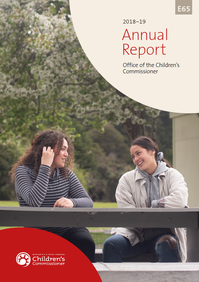27 November 2019 Corporate Documents
Annual Report 2019
This year has been one of the busiest I have experienced in my time as Children’s Commissioner, which I am pleased has been extended until the end of June 2021.
I am pleased that the outcome of the new monitoring, investigations and complaints function in respect of Oranga Tamariki has been confirmed. The Office is heavily involved with the establishment and structure of the Independent Children’s Monitor (ICM). It is appreciated that the Ministry of Social Development (MSD) has agreed to fund the costs for our time and involvement in the establishment of the ICM. This will go some way towards helping us backfill for our staff time to continue with our usual pressing responsibilities.
However, my involvement, and that of my staff, in the development of the ICM has been significantly more than anticipated. We are also conscious that everyone in government is working under considerable time pressure. I believe this presents a risk to the quality of the result. We are all keenly aware of the importance of getting the new organisation properly established. This work is a priority for the Office.
We are also operating in an environment of considerable cost pressures. I do not believe that I will be able to fully discharge my statutory functions or deliver on my identified priorities in 2020/21 within my current resourcing.
This is due to inadequate baseline funding which has not increased since 2009/10, and the addition of significant new responsibilities.
Even so, the Office has continued to deliver on our mandate to advocate for children and young people and stand up for them when their rights aren’t respected.
We championed the rights of children and young people in the media, made 15 submissions on child-centred legislation and policy changes, and gave over 100 presentations throughout Aotearoa New Zealand.
95% of our nearly 400 stakeholders agree our advocacy helped improve the wellbeing of children and young people.
What we achieved
Way back in 2012, we published our first Solutions to Child Poverty in New Zealand report. I am very pleased that our ongoing fight to reduce child poverty has resulted in New Zealand’s first Child Poverty Reduction Act 2018, based on the suggested draft Bill in our report.
We also successfully advocated for a ban on smoking in cars carrying children leading to the government changing the law.
We also published the What makes a Good Life? report - the voices of over 6,000 children and young people who told us:
- accept us for who we are and who we want to be
- life is really hard for some of us
- to help us, help our whānau and support crew
- we all deserve more than just the basics, and
- how you support us matters just as much as what you do.
These voices are the foundation of the government’s Child and Youth Wellbeing Strategy.
We also:
- interviewed 146 children and young people in custodial care
- completed 3 thematic reviews
- completed 13 monitoring visits to Oranga Tamariki residences
- published 2 State of Care reports • helped 368 people who called our 0800 224 453 child rights advice line • responded to hundreds of emails and letters
- heard the voices and learned from the experiences of thousands of children and young people, and
- worked with over 130 schools and community groups.
Our plans for the future
Over the next year, I want to see my commitment to appointing an Assistant Māori Commissioner for Children realised. I consider the need to provide authentic Māori leadership with the mana of the Children’s Commissioner to be urgent, for three reasons:
- It is crucial that the leadership structure of the Office contains and presents a clear Māori voice. Firstly, as a general principle, I believe that all 21st century public institutions in New Zealand should operate in ways that give practical effect to Te Tiriti o Waitangi.
- Secondly, tamariki and rangatahi Māori are disproportionately overrepresented in care and protection, and so are in greater need of advocacy and support for their welfare, rights and interests.
- Finally, Oranga Tamariki is now required, by way of section 7AA of the Oranga Tamariki Act 1989, to advocate for and prioritise whānau, hapū and iwi. It is therefore appropriate that I ensure my staff includes a leader who can support me and my Māori staff in encouraging Oranga Tamariki to discharge this duty, and to ensure a specific additional culturally appropriate focus on all tamariki and rangatahi Māori.
In addition, I will continue to support the campaign for the voting age to be lowered to 16, and fight to change the law so young people can’t be remanded into Police custody.
I will continue to hold the government to account for enhanced child wellbeing and measurable child poverty reduction, and fight to ensure the UN Children’s Convention is written into more laws.
A critical project for the Office over the coming year is the thematic review on what needs to change to support pēpē Māori (0 – 3 months) to remain in the care of their whānau in situations where Oranga Tamariki has been notified of care and protection concerns. Part one of our review will be published in early 2020.
I would like to thank the small and dedicated staff of the Office (who box above their weight) for their continued energy and commitment on behalf of all Aotearoa New Zealand’s 1.123 million children and young people.
Ngā mihi,
Children's Commissioner Judge Andrew Becroft
